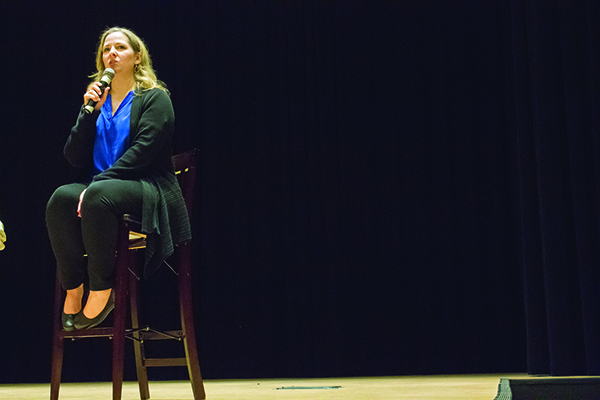From Economist to … Spy Novelist
Friday, October 6, 2017
Under the pen name of Ally Carter, Sarah Fogleman published the first book in the Gallagher Girls series in 2006. Since then, Fogleman has enjoyed success as a New York Times best-selling author.
Fogleman said she had the inspiration to write the Gallagher Girls series when she was watching television one night and the idea for a boarding school for teenage spies popped into her head.
“It was an idea I knew I couldn’t possibly pass up,” Fogleman said.
Even though she writes stories about spies, Fogleman grew up on a farm in Locust Grove, Okla., was a member of FFA, and earned her bachelor’s degree in agricultural economics from the College of Agricultural Sciences and Natural Resources at Oklahoma State University in 1997. Many people ask her if she wished she had studied creative writing or English instead of agricultural economics, she said, but she replies with “absolutely not.”
Fogleman said she knew she wanted to be a writer even when she was studying agricultural economics. However, she knew jobs in agricultural economics would allow for a secure, stable living and would provide a sense of self-satisfaction.
“I knew writing was something that, if I wanted to do it, there was absolutely no reason I couldn’t do it, whether or not I had a degree,” Fogleman said.
Joe Williams, professor emeritus of agricultural economics at OSU, was Fogleman’s academic adviser when she was an undergraduate student. He said Fogleman had tremendous ambition while at OSU.
“She was an unbelievable student,” Williams said. “She was a positive, very capable, very dedicated, very enthusiastic and outstanding student leader.”
Fogleman said her education in agricultural economics has helped her handle the business side of her writing career. She has to be a self-starter because no one tells her to get out of bed in the morning and meet her goals except her, she said. She stays motivated and dedicated because her farming background taught her how to work hard and complete a job, she added.
“Something I think about all the time is when I was a kid and we had just baled a bunch of square bales of hay,” Fogleman said. “It was getting ready to rain. I remember my dad going out there and hauling in hay. It was a ton of work in a very, very short amount of time, but I remember him talking about it and saying ‘It had to be done.’
“When I have a big deadline, I think about Dad and hauling in that hay and ‘It had to be done,’” she said. “Not to say farm kids are the only ones who grow up with that kind of example, but that was certainly the example I had growing up — the sense the work doesn’t stop just because you don’t feel like doing it.”
Fogleman said CASNR students learn a refined sense of work ethic that prepares them for success in the workplace, whether agriculture is involved or not.
“What I think employers are looking for from agricultural students is not that they grew up on a farm but that they have that sort of agricultural work ethic and mentality,” Fogleman said. “Any degree teaches you how to think, but to show that you have a learning aptitude is what most employers are after.”
Williams said it is not an anomaly for students with farming and ranching backgrounds to have the same desire as Fogleman to achieve goals.
“Young men and women who were raised in and had the opportunity to work in production agriculture learn first-hand that you’ve got to get busy and work hard to accomplish tasks,” Williams said.
Fogleman said while she does not regret deciding to write full-time, writing can be a strange profession.
“I’m not going to lie — it’s very strange,” Fogleman said. “There are parts of it that are incredibly glamorous, like when you go on book tour. Every now and then, you even get to go to Hollywood and have fancy meetings with movie stars. Mostly, though, the job is you sitting home alone in yoga pants that have bleach stains on them and talking to characters who aren’t there.”
Despite the oddities of the job, Fogleman said she is extremely happy with making a career of writing books. She said she loves writing for younger teens because they are a fun age group to write for.
“I hear from a lot of young readers who say things like ‘I never used to like reading until I read your books’ or ‘You made me want to be a spy, so I’m taking French this year and I’ve never had the courage to take a foreign language until I read your books,’” Fogleman said. “You get to, in an odd way, touch a lot of people’s lives because even though I’ll never meet a fraction of them, they go to school with my characters and my characters are like friends to them.”
Courtney O’Connor, an OSU biochemistry and molecular biology junior and a fan of Fogleman’s books for eight years, said she read “I’d Tell You I Love You, But Then I’d Have to Kill You” as an extra-credit assignment when she was in sixth grade. She said reading the first book made her fall in love with the Gallagher Girls series.
“The characters are just so cool,” O’Connor said. “I read them all again this summer, and I still love them as much as I did in sixth grade.
“‘I’d Tell You I Love You, But Then I’d Have to Kill You’ was one of the reasons I fell in love with reading books,” she added.
Fogleman said she is still writing books from her current location in Tulsa, Okla. She said she feels really lucky to be in a career she loves.
“I get paid to do what 12-year-old me always wanted to do,” Fogleman said.

